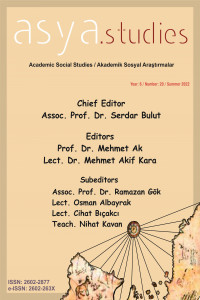OMİCRON’UN TANIMI, YAZIMI VE OKUNUŞUNA DAİR DÜŞÜNCELER
DEFINITION OF OMICRON, THOUGHTS ON SPELLING AND READING
___
- Ahmed, S. F.; Abdul Quadeer A. ve McKay, M. R. (2022). SARS-CoV-2 T Cell Responses Elicited by COVID-19 Vaccines or Infection Are Expected to Remain Robust Against Omicron. Viruses 14(79), 1-6.
- Chen, J.; Wang, R.; Gilby, N. B. ve Guo-Wei (2021). Omicron (B.1.1.529): Infectivity, Vaccine Breakthrough, and Antibody Resistance. Quantitative Biology. January 24; 62(2), 412-422.
- Çelgin, G. (2011). Eski Yunanca-Türkçe Sözlük. İstanbul: Kabalcı Yayınları.
- Demirel, S. (2021). Türkçe Telaffuz Sözlüğü. İstanbul: RTÜK.
- Dökmeci, İ. ve Dökmeci, H. (2011). Türkçe Okunuşlu Tıp Terimleri Sözlüğü. İstanbul: İstanbul Tıp Kitabevi.
- Eraslan, E. (2021). Korona, Korona Virüsü, Kovid-19, Pandemi, Virüs Sözcüklerinin Tanımı, Kökeni ve Yazımı. RumeliDE Dil ve Edebiyat Araştırmaları Dergisi, 0(25), 231-249.
- Erdemir, A. D. (2011). Güncel Tıp Sözlüğü. İstanbul: Alfa Yayınları.
- Eren, H. (2000). Türk Dilinin Etimolojik Sözlüğü. Ankara: Türk Dil Kurumu Yayınları.
- Google (2022) February Covid-19 Death https://www.google.com/search?q=februaray+covid-19+dead&oq=februaray+covid-19+dead&aqs=chrome..69i57j0i8i13i30l3.6691j1j9&sourceid=chrome&ie=UTF-8#colocmid=/m/02j71&coasync=0 adresinden 26.02.2022 tarihinde erişildi.
- Güler, Ç. (2012). Latince Tıp Terimleri Sözlüğü. Ankara: Palme Yayıncılık.
- He. X.; Hong, W.; Pan, X.; Lu, G. ve Wei X. (2022). SARS-CoV-2 Omicron Variant: Characteristics and Prevention, MedComm. 2021 Dec 16; 2(4), 838–45.
- Hemşirelik Terimleri Çalışma Grubu (2015). Hemşirelik Terimleri Sözlüğü. Ankara: Türk Dil Kurumu Yayınları.
- İlaç ve Eczacılık Terimleri Çalışma Grubu (2014). İlaç ve Eczacılık Terimleri Sözlüğü. Ankara: Türk Dil Kurumu Yayınları.
- İşcan, A. (2011). Türkçenin Yabancı Dil Olarak Önemi. Uluslararası Avrasya Sosyal Bilimler Dergisi, 2(4), 29-36.
- Kabaağaç, S. ve Alova, E. (1995). Latince Türkçe Sözlük. İstanbul: Sosyal Yayınları.
- Karasar, N. (2009). Bilimsel Araştırma Yöntemi. Ankara: Nobel Yayıncılık.
- Karol, S.; Suludere, Z. ve Ayvalı, C. (1998). Biyoloji Terimleri Sözlüğü. Ankara: Türk Dil Kurumu Yayınları.
- Kocatürk, U. (1999). Açıklamalı Tıp Terimleri Sözlüğü İngilizce, Latince, Grekçe Tıp Terimlerinin Dilimizdeki Açıklamalı Karşılıkları, (8. Baskı). Ankara: Ankara Üniversitesi Yayınları.
- Mete, Ş. (2020). Konuşturan Sözlük Vurgulu Teleffuz Sözlüğü, (2. Cilt). Ankara: TRT Yayınları.
- Newsnation (2022). There Are Several COVİD-19 Variants You Haven’t Heard of. https://www.newsnationnow.com/health/coronavirus/there-are-several-covid-19-variants-you-havent-heard-of/ adresinden 22.02.2022 tarihinde erişildi.
- NPR (2022). The Mystery of Where Omicron Came From-and Why it Matters. https://www.npr.org/sections/goatsandsoda/2021/12/01/1055803031/the-mystery-of-where-omicron-came-from-and-why-it-matters?t=163898816 adresinden 26.02.2022 tarihinde erişildi.
- Pulliam, J. R.C.; Schalkwyk, C. V.; Govender, N.; Gottberg, A. V.; Cohen, C.; Groome, M. J.; Dushoff, J.; Mlisana, K. ve Moultrie H. (2021). Increased Risk of SARS-CoV-2 Reinfection Associated With Emergence of the Omicron Variant in South Africa, medRxiv, 376(6588), 1-14.
- Sinanoğlu, S. (1953). Yunanca-Türkçe Sözlük. Ankara: Türk Tarih Kurumu Basımevi.
- T.C. Sağlık Bakanlığı (2022). Covid-19 Bilgilendirme Sayfası, Covid-19 Sözlüğü. https://covid19.saglik.gov.tr/TR-66394/covid-19-sozlugu.html adresinden 15.02.2022 tarihinde erişildi.
- The New York Times (2022). How Omicron, the New Covid-9 Variant, Got Its Name. https://www.nytimes.com/2021/11/27/world/africa/omicron-covid-greek-alphabet.html adresinden 22.02.2022 tarihinde erişildi.
- Tian, D.; Y. S.; H. X.; Q, Y. (2022). Theemergence and Epidemic Characteristics of The Highly MutatedSARS CoV-2 Omicron Variant. Journal of Medical Virology, 0(3 February 2022), 1-8.
- TRT (2022). Telaffuz Sözlüğü. https://trttelaffuz.com/ adresinden 26.02.2022 tarihinde erişildi.
- Tuğlacı, P. (1983) Tıp Sözlüğü İngilizce-Türkçe. İstanbul: Ar Basım Yayım.
- Türk Dil Kurumu (2011). Türkçe Sözlük. Ankara: Türk Dil Kurumu Yayınları.
- Türk Dil Kurumu (2022). Yazım Kuralları. https://www.tdk.gov.tr/icerik/yazim-kurallari/alinti-kelimelerin-yazilisi/ adresinden 17.02.2022 tarihinde erişildi.
- Türk Dili Kurumu (2022). Güncel Türkçe Sözlük. https://sozluk.gov.tr/ adresinden 25.02.2022 tarihinde erişildi.
- Türk Tabipleri Birliği (2021). Pandemi Bülteni #19 Pandeminin Omicron Dönemi: Ne Yapmalı? https://ttb.org.tr/haber_goster.php?Guid=d77da988-68a9-11ec-ae18-f82f027b6380 adresinden 24.03.2022 tarihinde erişildi.
- Ülker, S. (2004). Tıp Terimleri Sözlüğü Latince-Türkçe Türkçe-Latince, (3. Baskı). İstanbul: Erkam Matbaası.
- WHO (2022). Classification of Omicron (B.1.1.529): SARS-CoV-2 Variant of Concern. https://www.who.int/news/item/26-11-2021-classification-of-omicron-(b.1.1.529)-sars-cov-2-variant-of-concern adresinden 22.02.2022 tarihinde erişildi.
- Zülfikar, H. (2020). Gündemi Meşgul Eden Sağlık Terimleri. Türk Dili Dergisi, 69(821), 10-16.
- ISSN: 2602-2877
- Yayın Aralığı: Yılda 4 Sayı
- Başlangıç: 2017
- Yayıncı: Mehmet Akif KARA
ZEKİ VELİDÎ TOGAN’IN 1928-1932 YILLARI ARASINDA YAYINLANAN BAZI MAKALELERİ ÜZERİNE İNCELEMELER
Abdulhakim ÖZTEKİN, Veysel KOL, Kamuran TAYMUR, Erol YARAY, Yusuf SARIYILDIZ
EVLENME GELENEĞİ BAĞLAMINDA DÜĞÜNE YATIR OKUMA: DOĞANHİSAR (KONYA) ÖRNEĞİ
OĞUZ TANSEL’İN MASAL DÜNYASINA PSİKANALİTİK BİR YAKLAŞIM
Abdurrahim TUNÇ, Şarefettin YILDIZÖZ
ERKEN DÖNEM UYUMSUZ ŞEMALAR VE PSİKOLOJİK DAYANIKLILIK İLİŞKİSİ
Haydeh FARAJİ, Kübra UTAR, Nilgün Berfu BORAN
JEAN BAUDRILLARD’IN FELSEFESİNDE REKLAM
Tuğçe Arslan ÖZDİL, Bayram KAYA
